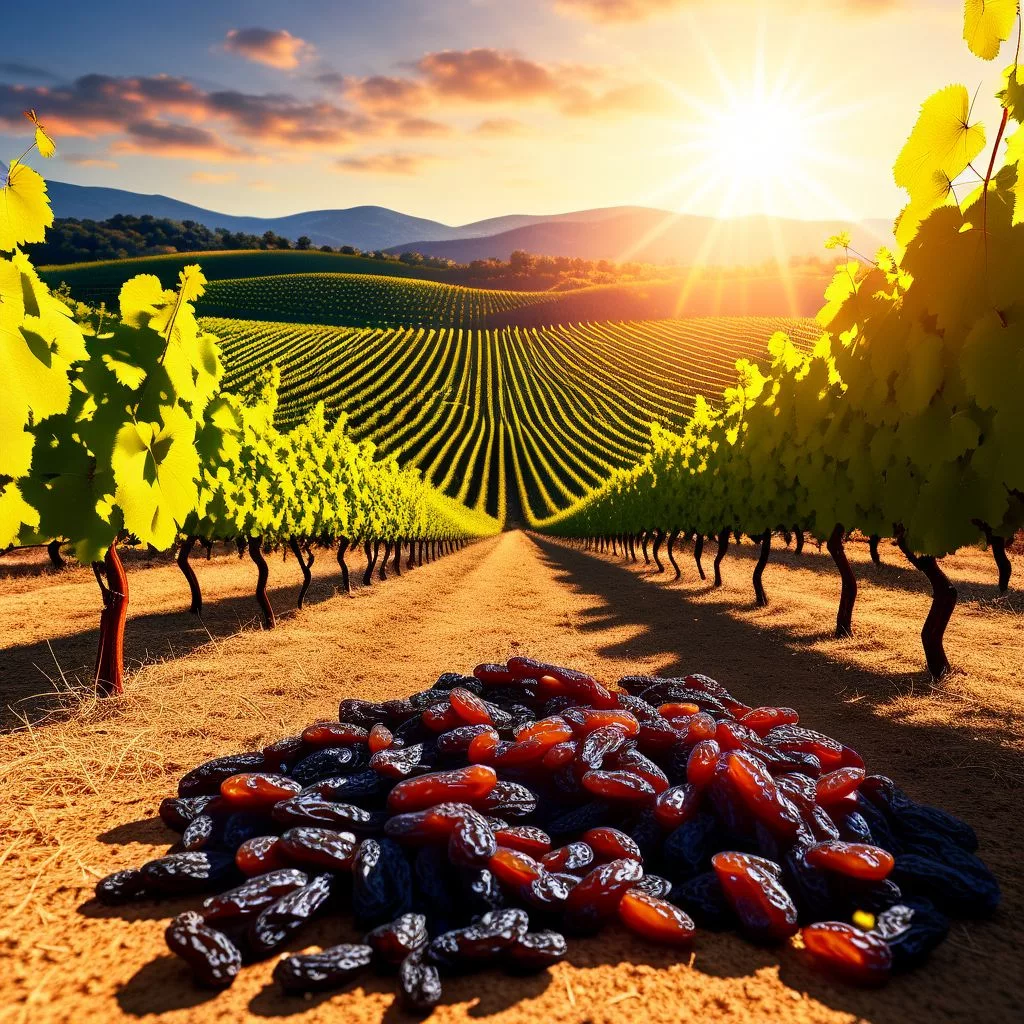South Africa’s raisin industry is thriving, showcasing strength and creativity even in tough weather. For the 2024-2025 season, farmers expect to produce between 96,000 and 104,000 tons of high-quality raisins, mainly for European markets. Despite some heavy rains that affected a few crops, many vineyards are flourishing, thanks to new sustainable farming practices and the natural sun-drying of grapes. With a growing global demand, particularly from Europe and the UK, South Africa is set to remain a leader in raisin production, blending traditional methods with modern innovations for a bright future.
What is the current state of South Africa’s raisin industry?
South Africa’s raisin industry is renowned for its resilience and innovation, consistently delivering high-quality products despite climatic challenges. With a projected yield of 96,000 to 104,000 tons for the 2024-2025 season, it continues to thrive, catering primarily to European markets.
A Beacon of Quality Amid Climatic Challenges
South Africa’s raisin sector exemplifies resilience and innovation, consistently delivering top-tier products to international markets despite erratic weather conditions. The nation has sustained its standing as a premier supplier of high-quality raisins, with produce reaching consumers worldwide. Remarkably, even the recent unusual weather patterns in the Lower Orange River region have not significantly hampered the industry’s momentum.
In the early months of 2025, the Lower Orange River area experienced unexpected heavy rains and humidity, leading to crop losses. These adverse conditions impaired the drying process and diminished the sugar content of the raisins, as reported by FreshFruitPortal. Despite these hindrances, a robust pre-harvest season ensured that crop development faced only minor delays, roughly two weeks behind schedule. According to Raisins South Africa, about 46% of the crop had already been delivered to packers and exporters. The marketable yield for this season is projected to range between 96,000 and 104,000 tons. Despite weather-related setbacks, production for the 2024-2025 season is still expected to surpass 90,000 tons, closely mirroring the previous year’s yield of 96,000 tons.
Expansion and Innovation in Vineyard Practices
The growth trajectory of South Africa’s raisin industry has been nothing short of extraordinary. Between 2020 and 2022, the country expanded its raisin production by planting an additional 2,535 hectares of vineyards in the Orange River and Olifants River regions. These newly established vineyards are now fully operational, contributing an additional 17,000 tons to the output. South African raisins are renowned for their natural sun-drying process, minimal pesticide use, vibrant color, rich flavor, and impressive 12-month shelf life. “We want the market and consumers to look to South Africa as a reliable and sustainable source of superior-quality raisins,” stated Wessel Lemmer, CEO of Raisins South Africa.
International demand for South African raisins has been consistently rising, with Europe being the largest buyer, accounting for 52% of exports in 2024. The United Kingdom has also shown increased interest, purchasing 12% of the exports, significantly higher than its four-year average. Premium varieties such as Merbein Seedless, Sultana Seedless, and Selma Pete remain in high demand, cementing South Africa’s role as a global leader in raisin production. The thriving industry is supported by over 700 growers managing around 1,000 farms.
Embracing Sustainable and Innovative Farming Practices
The resilience of South Africa’s raisin industry is not just a tale of enduring climatic adversities but also one of embracing expansion and innovation. The strategic planting of vineyards in regions like the Orange River and Olifants River has been crucial in enhancing production capacity. These areas offer ideal growing conditions, contributing to the superior quality of South African raisins.
Sustainable farming practices have increasingly influenced the South African raisin industry. A significant trend in recent years has been the shift towards environmentally friendly and health-conscious production methods. By minimizing pesticide use and employing natural sun-drying processes, South African raisin producers are aligning with global consumer preferences. This approach not only meets consumer demands but also ensures the preservation of product integrity.
South African farmers have demonstrated remarkable adaptability in the face of changing climatic conditions, fluctuating market demands, and economic challenges. This adaptability is evident in how the raisin industry has maintained high production levels despite adverse weather events. The industry’s commitment to quality is clear at every stage of the production process, from the careful selection of grape varieties to meticulous drying techniques. Each step is meticulously designed to enhance the final product, ensuring that South African raisins meet stringent international standards and are both delicious and nutritious.
Strategic Market Penetration and Future Prospects
The global reach of South African raisins underscores the country’s effective marketing and distribution strategies. By establishing strong trade relationships and leveraging the unique qualities of their product, South African raisin producers have successfully penetrated competitive markets. Europe’s consistent demand and the growing interest from the UK highlight the effectiveness of these strategies.
Beyond traditional markets, South African raisin producers are exploring new opportunities in emerging markets. The increasing global awareness of healthy eating habits and the nutritional benefits of raisins present new avenues for growth. By tapping into these trends, the South African raisin industry can further expand its global footprint.
The story of South Africa’s raisin industry is one of perseverance, innovation, and excellence. It is a microcosm of the larger agricultural narrative in South Africa, demonstrating how dedication to quality and strategic growth can overcome challenges. As the industry continues to evolve, it remains a shining example of how traditional practices and modern techniques can coexist to produce world-class products. This harmonious blend of old and new ensures that South African raisins will continue to be a preferred choice for consumers around the globe, securing the industry’s future for years to come.
“`markdown
What is the current state of South Africa’s raisin industry?
South Africa’s raisin industry is thriving, with a projected yield of 96,000 to 104,000 tons for the 2024-2025 season. The industry showcases resilience and innovation, consistently delivering high-quality products primarily to European markets, despite facing climatic challenges.
How has weather affected raisin production in South Africa?
While South Africa’s raisin industry has faced some adverse weather conditions, such as heavy rains and humidity, the effect has been manageable. Although these conditions have led to minor delays in crop development and affected some crops, the overall production for the 2024-2025 season is expected to exceed 90,000 tons, closely aligning with previous yields.
What sustainable practices are being implemented in South Africa’s raisin industry?
Farmers in South Africa are increasingly adopting sustainable farming practices, such as minimizing pesticide use and utilizing natural sun-drying processes for grapes. These methods align with global consumer preferences for eco-friendly and health-conscious products, ensuring that raisins maintain their quality and appeal in the marketplace.
Who are the primary consumers of South African raisins?
The primary consumers of South African raisins are located in Europe, which accounts for 52% of the country’s exports. The United Kingdom also shows a growing interest, purchasing 12% of the exports—significantly higher than its four-year average. This demand reflects the premium quality of South African raisins, especially varieties like Merbein Seedless, Sultana Seedless, and Selma Pete.
How has the raisin industry in South Africa evolved recently?
Between 2020 and 2022, South Africa expanded its raisin production by planting an additional 2,535 hectares of vineyards, primarily in the Orange River and Olifants River regions. This expansion has contributed an additional 17,000 tons to the output, demonstrating the industry’s commitment to growth and innovation amid challenges.
What are the future prospects for South Africa’s raisin industry?
The future of South Africa’s raisin industry looks promising, driven by both traditional markets and new emerging opportunities. As global awareness of healthy eating and the nutritional benefits of raisins increases, South African producers are well-positioned to expand their market reach. The combination of sustainable practices and strategic marketing will bolster the industry’s growth and maintain its reputation as a reliable source of high-quality raisins.
“`












